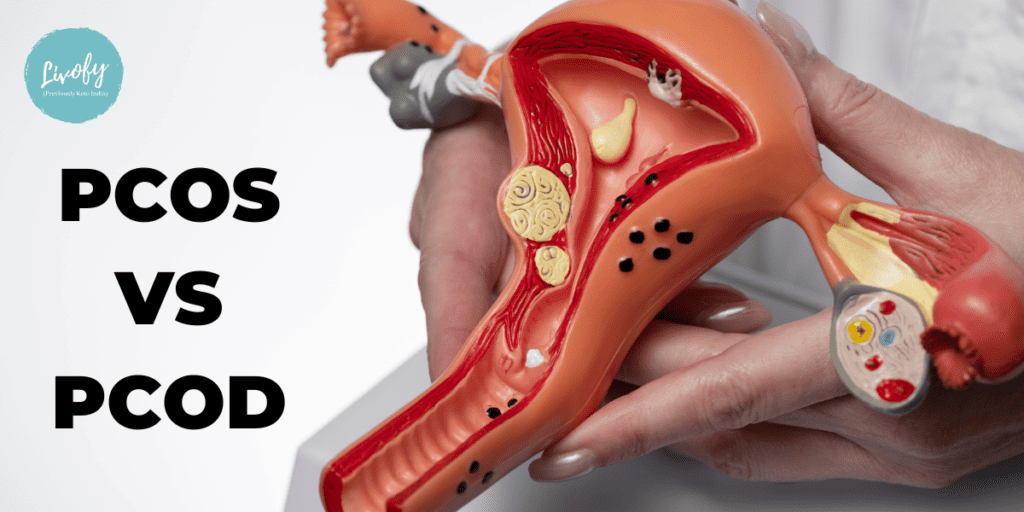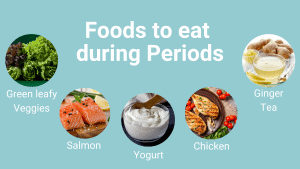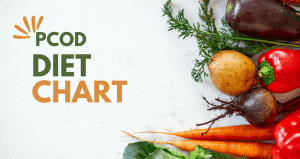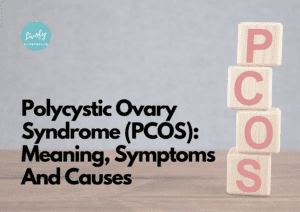A lot of people do not know the difference between PCOS and PCOD. It may sound similar but it has some differences. PCOD stands for Polycystic Ovarian Disorder and is a result of a hormonal imbalance in women whereas PCOS which stands for Polycystic Ovarian Syndrome and is a metabolic disorder.
Suffering from PCOS or PCOD can be debilitating and not finding the right medical help can worsen its symptoms. That’s why being more aware of these conditions can help you. This blog will dive into detail about the difference between pcos and pcod and also tell you about the diagnosis and treatment options available.
What is PCOD?
PCOD stands for Polycystic Ovarian disorder and is a result of the hormonal imbalance in a woman’s body. This caused the body to release immature eggs which turn into cysts during ovulation. This causes the ovaries to release large amounts of androgen (male sex hormone) which leads to an irregular menstrual cycle and symptoms like hair loss and weight gain.
What is PCOS?
PCOS stands for Polycystic Ovarian Syndrome. Unlike PCOD, this is a metabolic disorder and is much worse than PCOD. In this condition, ovaries release male sex hormones like androgen. Excess androgen in a woman’s body then leads to the formation of follicular cysts in the ovaries. These cysts can lead to no release of eggs during ovulation. A woman suffering from PCOS can suffer from symptoms like infertility, hair loss, and obesity. Hence, it is really important to have a PCOS Diet Plan
Difference between PCOD and PCOS with Examples
When it comes to pcos vs pcod, there are some differences between them. If you were confused between the two, given below is a table of the difference between pcos and pcod.
| Differences | PCOS | PCOD |
| Terminology | PCOS is the widely used and preferred term. | PCOD is an older term used in some regions. |
| Diagnostic Criteria | Diagnosis based on Rotterdam criteria, requiring at least two out of three features: irregular periods, high androgen levels, and polycystic ovaries on ultrasound. | Diagnosis is primarily based on ultrasound findings without the need for other criteria. |
| Hormonal Imbalances | Characterized by hormonal imbalances, including increased androgen levels and insulin resistance. | Primarily refers to the presence of multiple cysts on the ovaries, but may or may not be associated with hormonal imbalances. |
| Symptomatology | Wide range of symptoms such as irregular periods, hirsutism, acne, weight gain, and fertility issues. | Primarily focuses on ovarian cysts and may not encompass the broader range of PCOS symptoms. |
| Fertility Implications | Difficulties in conceiving due to hormonal imbalances affecting ovulation. | May or may not be associated with fertility issues. |
| Metabolic Factors | Frequently associated with metabolic disturbances like insulin resistance, impaired glucose tolerance, and increased diabetes risk. | May not necessarily encompass the same metabolic implications. |
| Long-term Health Risks | Increased risk of type 2 diabetes, cardiovascular disease, endometrial cancer, and depression. | May not be associated with the same level of long-term health risks. |
| Global Usage | Widely recognized and used globally. | Less commonly recognized outside of specific regions. |
| Research and Awareness | Extensive research, better understanding, improved diagnostic criteria, and increased awareness. | May not have the same level of research and awareness. |
| Treatment Approach | A multidisciplinary approach involving lifestyle modifications, medications, and specific interventions for fertility issues. | May not require the same level of intervention and treatment. |
PCOD Vs PCOS: Causes
When it comes to the causes of pcos vs pcod, in both cases it remains unknown. However, there are certain factors that play a role in their development that have been mentioned below.
PCOD Causes
The exact cause of pcod is still unknown. However, several environmental and genetic factors can cause pcod such as:
- Genetics: If you are from a family which has a history of pcod then there are chances that you may also experience it. If we compare pcos vs pcod, genetics play a huge role in both of them.
- Insulin resistance: Your body needs insulin to absorb blood glucose. Women who suffer from pcod often have higher levels of insulin in the body which can increase the levels of male hormones called androgens in the body.
- Obesity: Women who are obese are at a higher risk of developing pcod. This is due to the increased insulin resistance in the body. In pcos vs pcod, being obese leads to their development.
PCOS Causes
The exact cause of pcos is also unknown. However, there are various factors that can contribute to its development such as:
- Genetics: Genes can play a role in the development of pcos. If a woman’s family has a history of pcos then it can increase the chances of her suffering from pcos as well. In pcos vs pcod, the role of genetics in plays a role in their development.
- Race: There are certain races that are at a higher risk of developing pcos such as African and Hispanic women.
- Obesity: Being obese can increase insulin sensitivity in the body which can lead to pcos.
There are various products that can help you deal with the symptoms of PCOS. Buy PCOS Products Online
PCOD Vs PCOS: Problem Symptoms
When it comes to pcos vs pcod, the symptoms are very much the same. The symptoms of pcos and pcod have been mentioned below.
PCOD Symptoms
Women who suffer from PCOD may experience the following symptoms.
- Irregular periods: Having fewer periods or irregular periods is one of the many symptoms of PCOD. You may also experience periods that last longer than your usual periods.
- Androgen: This is another symptom of PCOS, too much androgen in the body may lead to excess facial and body hair.
- Ovaries with cysts: Polycystic ovaries are another symptom of pcos. The ovaries may not work as usual.
PCOS Symptoms
Women who suffer from pcos may experience the following symptoms.
- Irregular periods: Women suffering from pcos may experience irregular periods or periods that last longer than usual. It is similar to the symptom of pcod as there isn’t much difference between pcos and pcod symptoms.
- Weight gain: In pcos, the body cannot use insulin effectively which can cause insulin resistance in the body which leads to weight gain.
- Hair loss: In pcos, women experience higher levels of male hormones which lead to hair loss.
There isn’t much difference when it comes to the difference between pcos and pcod symptoms.
Check out these PCOS Transformation Stories
PCOD Vs. PCOS: Diagnosis
The diagnoses for pcod and pcos may differ slightly and the doctor may take a lot of things into account before diagnosing you with pcos or pcod. Let’s compare the diagnosis of pcos vs pcod.
PCOD Diagnosis
Before diagnosing you with pcos the doctor may look into the main characteristics of pcod such as high androgen levels and weight gain. Before diagnosing you with pcod the doctor may do the following:
- Check your family history: The doctor will ask about you any history of pcod in your family.
- Do a physical exam: Your doctor may perform a physical exam and look for extra hair growth, acne, and other signs of pcod.
- Blood samples: Your doctor may also take blood samples to see the androgen levels in your body.
There might be some difference between pcos and pcod when it comes to their diagnosis.
PCOS Diagnosis
Since there is no specific test to diagnose pcos, your doctor may ask you about symptoms, the medications you are on, and your family history of pcos. From there on your doctor may recommend the following things:
- Pelvic Exam: The doctor will check your reproductive organs for any abnormal growth.
- Blood tests: The doctors may recommend you various blood tests to check your androgen levels, cholesterol levels, or triglyceride levels.
- Ultrasound: Your doctor may suggest you an ultrasound to check the appearance of your ovaries.
To know more about PCOS, make sure to read about Polycystic Ovary Syndrome: PCOS Meaning, Symptoms
PCOD Vs PCOS: Problem Treatment Options
When it comes to treating pcos and pcod, lifestyle changes play a huge role. Your doctor may also give you various medications. Given below are the treatment options for pcos vs pcod.
PCOD Treatment
The treatment for pcod may include the following:
- Lifestyle changes: Making good lifestyle changes such as eating healthy, and exercising daily can help reduce the symptoms of pcod. Losing some weight can help in the better regulation of hormones in the body.
- Medications: Your doctor may put you on various medications such as birth control pills, progestin therapy, and metformin. Do not that the difference between pcos and pcod is the severity between them. Pcod has more severe complications than pcos, therefore it is necessary to get the right medical help.
PCOS Treatment
The treatment for pcos may include the following:
- Lifestyle changes: Making good lifestyle changes such as eating healthy, and exercising daily can help reduce the symptoms of pcod. Losing some weight can help in the better regulation of hormones in the body.
- Medications: Your doctor may put you on various medications such as birth control pills, progestin therapy, and metformin.
Hence, when it comes to pcod vs pcos treatment, there is a difference in it.
Learn more about PCOS Treatment & Diagnosis
PCOD vs PCOS – Diet
When it comes to dealing with pcos and pcod, diet plays a huge role. Eating healthy can reduce the symptoms and make you feel much better. Here is the comparison of pcos vs pcod when it comes to diet.
PCOD Diet
- Low glycemic index foods: foods that have a low glycemic index do not spike your blood sugar levels because they get digested slowly. These include fiber-rich fruits and vegetables, whole grains, and other low-carb foods.
- Antiinflammatory foods: foods like fish, berries, and various fruits and leafy greens can help to reduce inflammation-related symptoms in the body.
- Healthy fats: These are found in various nuts and seeds and fruits like avocados. Healthy fats are really good for the heart and help to lower cholesterol levels in the body.
The difference between pcos and pcod when it comes to diet is that, pcod can be treated with the help of lifestyle changes but pocs requires medical help.
PCOS Diet
If you are suffering from pcos then your diet must include:
- Foods rich in omega-3 fatty acids: Omega-3 fatty acids are really good for the heart and the brain. They are found in foods like fish and walnuts.
- Leafy greens: These have abundant amounts of antioxidants in them and they are also low in calories.
- Low glycemic foods: The best thing you can do when going through pcos by eating foods that have a low glycemic index such as whole grains, fiber-rich fruits, and veggies. Did you know about the First Signs Of PCOS
A Diet Plan To Address PCOD and PCOS Should Be Like This
If you are going through pcod then the diet plan given below can help you manage it.
| Days | Breakfast | Lunch | Snack | Dinner |
| Day 1 | Stuffed Besan Cheela | Paneer Tikka with Veg Salad | Tea and Makahans | Multigrain Roti with Sarso ka Sag |
| Day 2 | Sprouts Cheela | Soyabean Curry with Roti | Tea and Makahans | Vegetable Quinoa |
| Day 3 | Poha with Curd | Brown Rice, Mix Dal, VegSalad | Tea and Makahans | Shahi Paneer with Brown Rice |
| Day 4 | Quinoa Sprouts Upma with Curd | Soybean Lentil Bhurji with Roti | Tea and Makahans | Methi Paratha with Cucumber Raita |
| Day 5 | Ragi Dosa, Sambhar, Buttermilk | Mix Dal, Rice, Curd, and Salad | Tea and Makahans | Vegetable Quinoa |
| Day 6 | Sprouts Cheela | Soyabean Curry, Multigtrain Roti | Tea and Makahans | Vegetable Quinoa |
| Day 7 | Stuffed Besan Cheela | Paneer Tikka, Vegetable Salad | Tea and Makahans | Sarso ka Saag with Multigrain Roti |
PCOD Vs Pcos: Risk Factors for Each Condition
Both pcos and pcod can be really hard to deal with. It is really important to get timely help and not ignore these health conditions which may lead to the symptoms getting worse. Let’s compare the risk factors for pcos vs pcod.
Risk Factors For PCOD
The risk factors for pcod include:
- Diabetes: In these conditions, your pancreas is not able to produce enough insulin in the body to metabolize sugar. This leads to an increase in blood sugar levels in the body.
- Hypertension: In pcod women suffer from insulin resistance which can also lead to hypertension.
Check out this PCOD Diet Chart – PCOS Diet Plan for Weight Loss
Risk Factors for PCOS
The risk factors for pcos include:
- Diabetes: In these conditions, your pancreas is not able to produce enough insulin in the body to metabolize sugar. This leads to an increase in blood sugar levels in the body.
- Mental health issues: According to NCBI, women with pcos are more prone to having mental health issues such as anxiety and depression.
Which is more complicated – PCOD or PCOS?
Both pcos and pcod can be debilitating but pcos is more serious for women as compared to pcod. By living a healthy lifestyle pcod can be treated but when it comes to pcos, the implications are much worse and require proper medical treatment.
Conclusion
There is a bit of confusion regarding the difference between pcos and pcod. PCOD stands for Polycystic Ovarian disorder and is a result of the hormonal imbalance in a woman’s body. This caused the body to release immature eggs which turn into cysts during ovulation.
PCOS stands for Polycystic Ovarian Syndrome. Unlike PCOD, this is a metabolic disorder and is much worse than PCOD. In this condition, ovaries release male sex hormones like androgen. Both pcos and pcod can be really hard to deal with. However, pcos is more serious and has worse implications than pcod. One can manage pcod with the help of a healthy lifestyle but when it comes it pcos, proper medical care is required.
FAQs
Is PCOD or PCOS curable?
No, PCOS cannot be cured but with the help of the right medical care and lifestyle, the symptoms can be managed.
PCOD vs PCOS – Are PCOD and PCOS the same?
In PCOD, immature eggs are released by the ovaries which causes hormonal imbalances. In PCOS, the ovaries produce excess androgen which makes the eggs develop cysts.
What is the major difference between PCOD and PCOS?
In PCOD, immature eggs are released by the ovaries which causes hormonal imbalances. In PCOS, the ovaries produce excess androgen which makes the eggs develop cysts.
Does PCOD become PCOS?
PCOS is a much severe form of PCOD and a metabolic disorder. In PCOS, the ovaries produce excess androgen which makes the eggs develop cysts.
Which is more harmful PCOS or PCOD?
PCOS is more serious and has worse implications than PCOD as one of the main differences between pcos and pcod is the severity of it’s implications. One can manage PCOD with the help of a healthy lifestyle but when it comes it PCOS, proper medical care is required.









